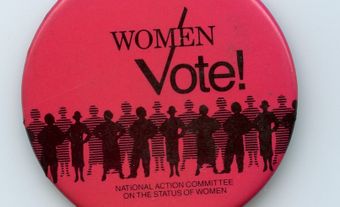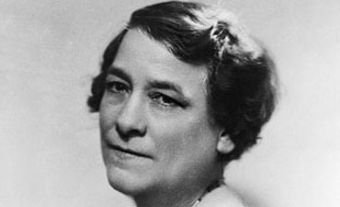Thaïs Lacoste-Frémont, women’s rights activist, journalist, speaker (born 18 October 1886 in Montréal, Québec; died there 6 April 1963). Thaïs Lacoste made promoting women’s rights her life’s work. All her efforts focused on a single goal: encouraging women to take their rightful place in suffrage legislation development, civil law for married women, education and politics.
Education and Early Career
Thaïs Lacoste was born in Montréal on 18 October 1886. She was the 11th child in a middle-class family with 13 children. Four of the daughters made Québec history: Marie Lacoste-Gérin-Lajoie, one of Québec’s most eminent feminists, devoted herself to social action; Justine Lacoste-Beaubien was the main founder of Sainte-Justine Children’s Hospital in Montréal and the institution’s director for several decades; Berthe Lacoste-Dansereau was a businesswoman who built and operated a renowned catering company in Montréal that is still in business today; and, finally, Thaïs Lacoste-Frémont, who spent her adult life in Québec City continuing the family tradition by becoming involved in different social and political movements.
Like her sisters, Thaïs Lacoste studied at the Hochelaga Convent run by the Sisters of the Holy Names of Jesus and Mary, completing the highest level of education available to young girls at the time and distinguishing herself by earning a medal of achievement from the Governor General of Canada. Her father, Alexandre Lacoste, a lawyer, senator and professor at the Montréal campus of Université Laval (now Université de Montréal), taught her the basic principles of law.
In 1907, she became treasurer of the Hôpital Sainte-Justine founding committee. She was 20 years old at the time and already well acquainted with the philanthropic work of her mother, Marie-Louise Globensky.
She married Québec City lawyer Charles Frémont in 1910 and gave birth to four children between 1910 and 1922.
Fight for Women’s Suffrage
The right to vote, which Canadian women were granted in 1918, opened up a wide sphere that had to be navigated and occupied in order to exercise any influence in it. Thaïs Lacoste joined other women in the fight for provincial suffrage. In 1922, the women of Québec were the only women in Canada who could not vote for members of their provincial parliament. The struggle was a long one: it was only in 1940, under Adélard Godbout’s Liberal government, that the women of Québec were granted this right.
In 1925, Lacoste was drawn into the political upheaval within the federal Conservative Party, and the support she lent it by giving speeches and organizing partisan meetings took her into the political forum. In 1926, she founded the Association des femmes conservatrices (AFC) of Québec and became its chair, a position she held until 1936.
In October 1927, she was a delegate to the Conservative Party’s national convention in Winnipeg, Manitoba, where she stood out for giving her address in both French and English. She was appointed Québec’s representative on the party’s National Council.
That same year, she embarked on a speaking tour of Women’s Canadian Clubs in various Ontario cities, including Toronto. These events were organized to promote understanding between French-speaking and English-speaking Canadian women on the 60th anniversary of Confederation.
International Representation and Journalism
In 1930, Richard Bedford Bennett was elected as a Conservative. Québec City, like other parts of the country, was hard hit by the Great Depression. Thaïs Lacoste became involved in committees working to develop employment opportunities for the unemployed who could hold positions in the federal public service in Québec City or elsewhere.
In 1932, she was appointed Canada’s delegate to the 13th conference of the League of Nations in Geneva, Switzerland. She was the first French Canadian woman included in the delegation and only the second woman in the country. This trip, during which she developed a large network of international relationships, marked a turning point in her public life.
Armed with these new experiences, she became a columnist with Montréal newspaper La Patrie in 1933, publishing one or two columns per week for the next three years. She had already contributed to Le Journal and sporadically to other newspapers such as L’Événement de Québec.
In 1933, Lacoste was a delegate to the Institute of Pacific Relations conference in Banff, Alberta. She also worked with numerous associations over the course of her career, including the Cercle des femmes canadiennes, Ligue catholique féminine, École d’Action catholique, National Council of the League of Nations Society in Canada, Québec City chapter of the Fédération nationale Saint-Jean-Baptiste, and Consumers' Association of Canada.
Legal Rights of Married Women
The culmination of her work was undoubtedly the course she taught the women of the Cercle de l’Amicale de Jésus-Marie in Sillery. Titled “Les droits de la femme mariée dans la vie civile et politique de la province de Québec” (“The rights of the married woman in the civil and political life of the province of Québec”), the course consisted of a series of four lectures given in the fall of 1947. The content was typed up and distributed to associations across the province, and some elements were used in drafting Bill 16, which MPP Claire Kirkland-Casgrain introduced before the National Assembly of Québec in 1964. The passage of Bill 16 gave certain legal rights to married women, including the power to enter into contracts without the consent of their husbands (see Women and the Law).
Social and Political Legacy
Thaïs Lacoste’s unwavering belief in the women’s movement spurred her to action throughout her life. She felt that the establishment of a true democracy required full participation in society, which could not exist without women’s contributions to social and political life.
A firm believer in social justice, Lacoste was intent on equality and freedom for the women of Québec. However, it was by changing attitudes through her words and deeds that this pioneer of Québec’s feminist movement made her main contribution. She is responsible for spreading some of the most influential ideas that led to the social reforms of the Quiet Revolution.
The building on Cook Street in Québec City that houses the offices of the Council on the Status of Women now bears her name. In 2008, an endowment fund was established in her name within the Fondation de l’Université du Québec en Outaouais. The purpose of the fund is to promote research on women’s issues and, to that end, it grants scholarships to male and female graduate students who work on these issues.
Archival information on Thaïs Lacoste-Frémont is housed at the Centre de référence de l’Amérique française of the Québec Musées de la civilisation.

 Share on Facebook
Share on Facebook Share on X
Share on X Share by Email
Share by Email Share on Google Classroom
Share on Google Classroom




